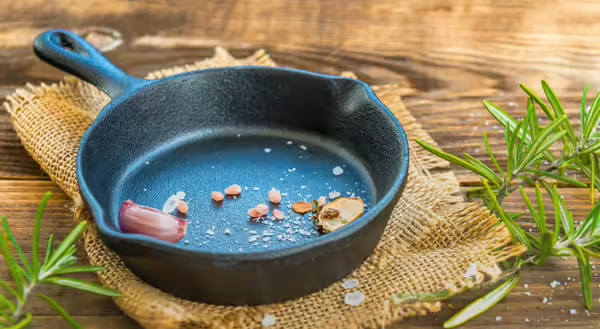
Early settlers began using cast iron for cookware hundreds of years ago, and it’s no wonder they’re still found in many home kitchens today. Cast iron is extremely versatile; it can be used to bake cornbread, stir-fry vegetables, or sear a fillet. The heavy pans will provide more even heat distribution than today’s lightweight aluminum pans. Plus, it’s inexpensive and only gets better with age!
Using cast iron for cooking provides an extra nutrition bonus: more iron in the diet. Cast iron cookware leaches iron into the food, a potential benefit for those who need additional iron, including pregnant women and those with iron deficiency anemia. Acidic foods with high moisture content, such as tomatoes, absorb the most iron. However, the acid works to break down the seasoned pan, requiring it to be re-seasoned more often.
What does it mean to season a pan? It means preconditioning the pan, usually with oil or shortening, to prevent foods from sticking. Once you have bought a cast iron pan and washed it according to the manufacture’s directions, you will need to season it before use. Some newer cast iron cookware may be bought pre-seasoned, but it may eventually need to be seasoned again. Once it appears dry and discolored or when food begins to stick, the pan will need to be re-seasoned.
To season a pan:
- Preheat the oven to 450°F.
- Rub a thin layer of cooking oil along the inner bottom and sides of the pan. You may even coat the outer sides of the pan, too.
- Place the cookware upside down on a baking sheet lined with aluminum foil.
- Place on the bottom oven rack and bake for one hour.
- When the pan is no longer hot to touch, use a paper towel or soft cloth to gently wipe off any additional oil.
Tips for caring for your cast iron cookware:
Don’t use harsh detergents and scrub pads when cleaning your cast iron cookware. It will wear off the protective coating and will need to be re-seasoned. And never put your cast iron cookware in the dishwasher! Always hand-wash cast iron using a mild or diluted soap and a soft sponge or cloth to clean the pan. Dry the pan thoroughly. Any moisture left on the pan may cause it to rust. If it does rust, you should use a scrub pad and clean the pan well, dry it, and re-season. Enjoy using your cast iron cookware!
About the Author
Jenna Smith is a Nutrition and Wellness Educator with University of Illinois Extension, serving Livingston, McLean, and Woodford Counties. Smith uses her experience as a registered dietitian nutritionist to deliver impactful information and cutting-edge programs to Livingston, McLean, and Woodford Counties and beyond.